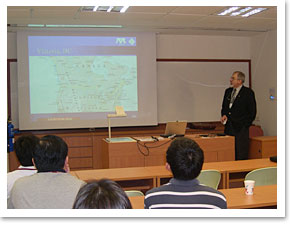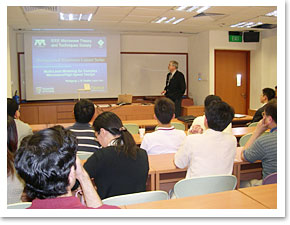|
The Year 2006 is another year during which the IEICE Singapore Section has organized
some good activities for IEICE members in Singapore. In summary, the Singapore
Section Office has organized two major seminar series, that is,
 (1) Radar Systems Series:
Waves and Physics, and (1) Radar Systems Series:
Waves and Physics, and
 (2) Applied Electromagnetics
Series: Microwave & Antennas. (2) Applied Electromagnetics
Series: Microwave & Antennas.
The first seminar series, Radar Systems
Series: Waves and Physics, was held at Engineering Building EA-06-06, National
University of Singapore on February 28, 2006. Two seminars were delivered, entitled
as "Anomaly Radar Echoes from the Mesosphere: Observations and Scientific
Problems" and "Ionospheric Scintillations and Concerning Applications".
Also a Technical Tour with Interaction Session on GPS Ionospheric scintillation
Receiving System was organized as well. These two seminars both addressed the
recently focused technical issues associated with high frequency (HF) and very
high frequency (VHF) radar system when utilized for atmospheric explorations and
target identifications (which are covered by the IEICE areas of interests). With
the technology advancement, advances on wave propagations and physical mechanism
are made and were explained in the seminar series. The invited speaker is Professor
Jian Wu, Director of National Key Laboratory of Electromagnetic Environments,
Beijing, China and Deputy Director General of China Research Institute of Radiowave
Propagation (CRIRP), Xinxiang, China. He is one of the world recognized experts
in the respective area, having served in various national and international committees
and worked for a couple of giant global projects. He brought the state-of-the-art
information and advancements to the IEICE audience and attendees for knowledge
broadening. A good attendance of this seminar series by IEICE members in Singapore
was received.
 |
|
|
(a)
|
(b)
|
 |
|
|
(c)
|
(d)
|
Figure 1: Two seminars delivered by Professor
Jian Wu and a GPS Ionospheric Scintillation Receiving System demonstrated. (a)
Prof. Wu was explaining the ionospheric profile, (b) Ionospheric scintillations
and activities were observed and recorded via the ionograms recorded by radar
system, (c) Prof Wu was explaining on how the GPS Ionospheric Scintillation Receiving
System works, and (d) Mutual interactions were made with some audiences.
The second seminar series, Applied Electromagnetics
Series: Microwave & Antennas, was conducted at Engineering Building
E4-04-07, National University of Singapore on March 3, 2006. The invited speakers
are Professor Wolfgang Hoefer from Department of Electrical and Computer Engineering,
University of Victoria, Canada and Associate Professor Qiang Chen from Department
of Electrical and Communication Engineering and Graduate School of Engineering
at Tohoku University, Japan.
Professor Hoefer's talk is entitled as "Multi-Level Modeling
for Complex Microwave/High-Speed Design", and it is, in fact, the IEEE MTT
Society's Distinguished Lecture talk. The purpose of his lecture is to familiarize
our members with evolving design approaches for systems of large technological
and functional complexity, and to demonstrate how microwave modeling and design
practices can be integrated into a wider flexible multi-level modeling environment.
Techniques for interfacing models at the behavioral, network, circuit and field
levels were demonstrated. They range from order reduction of field models to the
coupling of field- and circuit solvers, extraction of equivalent circuits from
field solutions and measurements, behavioral representation by neural networks,
and the linking of electromagnetic and thermal solvers. He also described different
parts of a complex structure by the most appropriate model of lowest possible
order, while maintaining a two-way correspondence between functional behavior
and physics across the modeling hierarchy. At the end of his talk, Prof. Hoefer
was kind to distribute a few copies in CD of his own company's commercial software
packages as a gift to our members.
 |
|
|
(a)
|
(b)
|
 |
|
|
(c)
|
(d)
|
Figure 2: Lectures by Professor Wolfgang
Hoefer from University of Victoria, Canada. (a) Prof. guided audience to the Univ
of Victoria via a world map, (b) Response of a passive circuit designed by Prof.
Hoefer's software package, (c) Prof. Hoefer is introducing the microwave component
designs, and (d) Audience in the lecture by Prof. Hoefer.
In the second talk, Prof. Chen has briefly introduced the history
of researches in antennas and EM engineering at Tohoku University. He also highlighted
a number of present projects in the electromagnetic wave engineering laboratory,
especially focus is made on some topics such as accurate and fast EM simulators
for large-scale array antennas, adaptive array antennas for mobile communications,
fast antenna measurement technology and equipment.
 |
|
|
(a)
|
(b)
|
Figure 3. Lecture by Prof. Q. Chen from
Tohoku University, Sendai, Japan. (a) Prof. Chen is introducing the log periodic
antenna design after his introduction of the historical Yagi-Uda antenna originated
at Tohoku University, and (b) Prof. Chen is briefing on recent research activities
in antennas and EM engineering at Tohoku University, the home of Mr. Koichi Tanaka,
one of three Nobel Prize Laureates in Chemistry of 2002.
As the founding Officer of the IEICE Singapore Section, I hereby
again announce that the IEICE Singapore Section Office will continue to provide
quality services to Singapore members within the IEICE allocated budgets, namely,
|
*
|
Members can access to IEICE Transactions in both Japanese and
English in the form of either hard copy or CD-ROM. Members can approach me for
the materials, provided that the IEICE copyright policy stands; |
|
*
|
We will also have two meetings per year subject to the necessity
of both technical and social activities requirement; |
|
*
|
In addition, we plan to have some more technical talks. We
will invite a couple of prominent professionals in frontier research & development
from Japan or other countries (namely, "IEICE Distinguished Lecturers")
to deliver seminar series on hot topics to our Singapore local members. |
I look forward to your active participation and intensive involvement
in our Section activities and look forward to meeting you again.
In the coming year, the IEICE Singapore Office is looking forward
to more new members to join the IEICE. Also, the IEICE Singapore Section will
try its best to provide quality services to our members. At the same time, the
Singapore Section Office is looking forward to the active participation and involvement
of our members. If there is any query on services and other issues, please directly
contact me at the following address:
|

